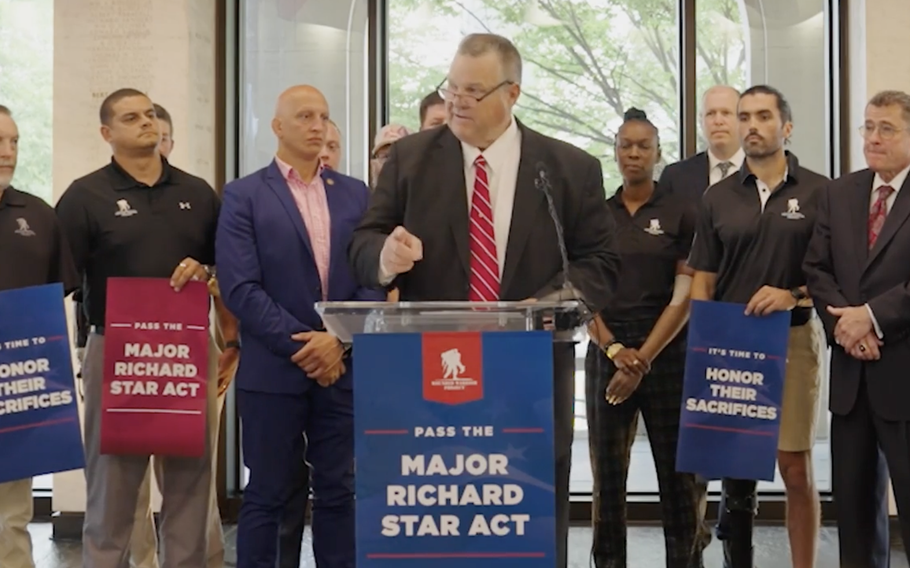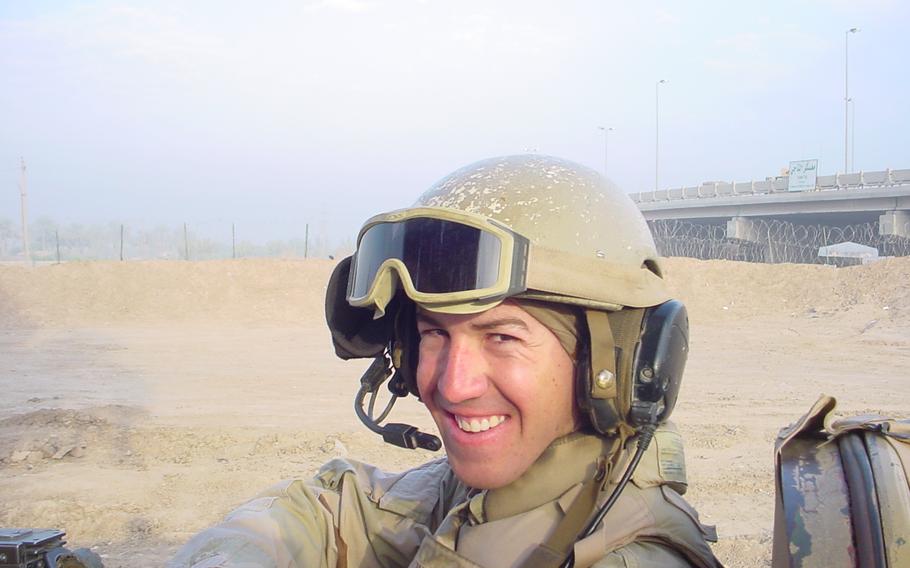
“Congress has the opportunity to do the right thing for these veterans and their families,” Sen. Jon Tester, D-Mont., said Wednesday, July 10, 2024, at a rally organized by veterans groups pushing for Congress to restore full retirement benefits to disabled veterans medically retired from service due to combat injuries. (Linda F. Hersey/Stars and Stripes)
WASHINGTON — Ryan Kules was leading a military patrol in Iraq in 2005, when the blast from a roadside bomb threw him from his vehicle and severed his right arm and left leg.
Kules, a former Army captain, was stabilized at a hospital in Baghdad and airlifted to a military hospital in Germany for emergency surgery to clean up and close his wounds. He was transferred to Walter Reed National Military Medical Center in Bethesda, Md., where he underwent more than two dozen surgeries followed by 18 months of rehabilitation.
Medically retired from military duty in May 2007, Kules now fights a battle on a different front. He and other disabled veterans whose military careers were cut short by serious combat injuries are pressing Congress to overturn a federal law that keeps them from receiving full retirement benefits for time served.
Sen. Jon Tester, D-Mont., chairman of the Senate Veterans’ Affairs Committee, filed an amendment Thursday to the 2025 National Defense Authorization Act, which sets policies and recommends expenditures for the Pentagon, to ensure combat-injured veterans with less than 20 years of service receive full benefits when they are medically retired. The legislation has more than 50 co-sponsors.
A previous attempt in fiscal 2023 stalled over concerns about costs. Tester, along with Sen. Mike Crapo, R-Idaho, added language from the Major Richard Star Act of 2023 to the 2025 NDAA.
Retirement pay for disabled veterans with less than 20 years of service is reduced dollar-for-dollar by the compensation that they receive from the Department of Veterans Affairs for their injuries.
“Congress has the opportunity to do the right thing for these veterans and their families,” Tester said Wednesday at a rally on Capitol Hill organized by veterans groups to push for adoption of the legislation. “Americans have stepped up and served their country with a solemn promise that if they came home changed by their service, we would take care of them. For combat-injured veterans forced to retire before completing 20 years of service, their government is currently failing to deliver on that promise.”
The Congressional Budget Office estimates the legislation will increase direct spending by more than $8 billion for the next 10 years.
“This is the cost of war,” Tester said at the rally, which was attended by several combat-injured veterans from across the United States. “You heard a number of folks come up here. You saw their battle wounds. If that shouldn’t be mandatory spending, what the hell should?”
Crapo described the legislation as correcting a “severe injustice.”

Ryan Kules, a former Army captain, is shown in a 2005 photo taken weeks before he was seriously injured by a bomb blast in Iraq. Medically retired from military duty in 2007, Kules and other disabled veterans whose military careers were cut short by combat injuries are pressing Congress to overturn a federal law that keeps them from receiving full retirement benefits. (Ryan Kules)
Members of the Wounded Warrior Project, Veterans of Foreign Wars, Military Officers Association of America, the Military Coalition and Reserve Organization of America expressed support for the legislation.
More than 53,000 veterans do not receive full retirement benefits after leaving the military because they are collecting disability compensation for combat-related injuries, according to Wounded Warrior Project, a nonprofit organization that advocates for veterans who experienced combat-related injuries.
“I was forced out of the military. The decision on making the military my career was taken away from me. Because of that, I had to forfeit my military retirement pay,” said Adam Kisielewski, a former Marine Corps sergeant medically retired in October 2006 after suffering catastrophic injuries in a bomb blast near Fallujah, Iraq. “Disability pay has made up for some of the loss revenue from injuries sustained but not all.”
Kisielewski was wounded in 2005 when a bomb rigged to the door of a building detonated. He and another Marine were searching the building from room-to-room after a recent gunfight with insurgents in the area, when they were hit by the blast. Kisielewski was 21 years old and had joined the military in 2002. The other Marine did not survive.
“My platoon was nearby. That’s ultimately what saved my life,” said Kisielewski, who received first aid at the scene, was loaded onto a Humvee and rushed to a military hospital.
From there, he was flown to Germany for medical treatment and then transferred to Walter Reed.
The severity of his wounds required the amputation of his left arm at the shoulder and his right leg below the knee. His left leg also required several surgeries.
“I was fortunate to make it out alive,” said Kisielewski, who was medically retired after more than a year of surgeries and rehabilitation. “It’s been a long road to recovery.”
He now runs a nonprofit called NPLB Outdoors, which stands for no person left behind. The group provides outdoor recreational adventures for veterans with disabilities. He continues to undergo operations to remove stray shrapnel from his body.
But only disabled military members with 20 years of service with at least a 50% disability rating qualify to collect full retirement benefits along with disability pay.
Kisielewski and Kules are 100% disabled, but their military careers abruptly ended because of the seriousness of their injuries.
“We are asking for the same consideration. We did not have a choice about leaving the military,” Kules said.
“We’re asking for something we feel we earned when we were injured,” Kisielewski said.
In 2023, the Major Richard Star Act had 326 co-sponsors.
The Congressional Budget Office estimated on average that combat-injured retirees would have $1,200 of their military retirement restored per month. The bill does not authorize retroactive benefits.
The Defense Department makes annual accrual payments into the Military Retirement Fund, according to a 2023 report by the CBO. The office estimated payments by the department will climb from about $24 billion in 2024 to about $31 billion in 2033.
If the legislation is enacted, costs would increase by another 3%, as future veterans with combat-related disabilities receive the full amount of their retirement pay, the CBO said.
“Pass the Major Richard Star Act now,” said Marquis Barefield, a medically retired Army veteran and assistant national legislative director for Disabled American Veterans. “It’s time to end this wait. The men and women who served this country and were forced to be medically retired need to get the benefits they deserve.”
The legislation is named after Army Reserve Major Richard Star, who died in 2021 from terminal lung cancer. Star was medically retired in 2018 after he developed cancer linked to his service in Afghanistan and Iraq, where he was exposed to burn pits and other toxins in war zones.
Kules and other veterans said the law keeps them from collecting retirement pay for time served that would help support themselves and their families.
“As a platoon leader, I was charged with bringing guys home safe. But I was unable to complete that mission. And I had no choice whatsoever in continuing my military career,” he said.
Kules now serves as a director at the Wounded Warrior Project working with veterans to overcome trauma through adventure-based learning.
“I know the point of disability compensation is to take care of future lost earnings because of service-connected injuries or illness,” he said. “But having my retirement pay reduced to nothing because I am receiving disability compensation negates my service and commitment.”